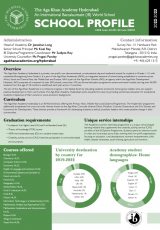DP1 service and stewardship in action through CAS
The CAS (Creativity, Activity and Service) portfolio is an integral part of the International Baccalaureate Diploma Programme and comprises a graduation requirement. The ‘creativity’ component includes art and other experiences that involves creative thinking; ‘activity’ suggests physical exertion contributing to a healthy lifestyle; service is an unpaid and voluntary exchange that has a learning benefit for the student (www.ibo.org). Through CAS, students are able to apply theoretical learnings gleaned from their other subjects and put these into practice. As service and stewardship form the ethos of what it means to be an Academy student, the service aspect of CAS also fits in with His Highness the Aga Khan’s vision to raise ethical home-grown leaders who will be able to change tomorrow’s outcomes in the developing world.
 First-year Diploma Programme (DP1) students have spent the last six months affiliated with government hostels, a home for the hearing impaired, an organic farm and elderly care centres. They visit the sites once a week on Sundays for three hours. Through their regular interactions with the groups they visit and the diverse activities they conduct, they have built relationships that are meaningful and beneficial to both parties. Additionally, some of them have independently come up with ingenious ideas such as ‘Manha’, the arts-crafts initiative that has sold art from Ashray Akruti (a school for the hearing impaired) at the last Academy Senior School Parent–Teacher Meeting in December, raising INR23,000 towards vocational training, studies, a discovery science program and art workshop.
First-year Diploma Programme (DP1) students have spent the last six months affiliated with government hostels, a home for the hearing impaired, an organic farm and elderly care centres. They visit the sites once a week on Sundays for three hours. Through their regular interactions with the groups they visit and the diverse activities they conduct, they have built relationships that are meaningful and beneficial to both parties. Additionally, some of them have independently come up with ingenious ideas such as ‘Manha’, the arts-crafts initiative that has sold art from Ashray Akruti (a school for the hearing impaired) at the last Academy Senior School Parent–Teacher Meeting in December, raising INR23,000 towards vocational training, studies, a discovery science program and art workshop.
Below are excerpts from DP1 student reflections on their service activities.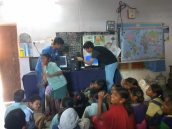
“In December 2016, I had an opportunity to start a project of my own, with enough monetary resources. My first challenge was to look for a team, a team that was keen, motivated and willing to share their skills and pass it on, for the betterment of society. Then, the planning; we had to come up with a project that would be sustainable enough for the kids to learn something out of it and implement those skills in their lives. We decided to hold a cultural workshop, wherein students were exposed to modern dance styles, paper recycling, computer lessons, art workshops and enhanced their skills in sports like cricket and football.
Seeing their happiness, I had made a sort of a connection with them even when we couldn’t speak one common language. Most of them belonged below the poverty line, however, this did not limit their happiness and enthusiasm. They did not fail to inspire me; as they learnt from me, I learned something more important from them: the true sense of giving back to the society. In the end, we conducted a small show wherein the students showcased their skills in each of these aspects. By the end of the project, we had enough funds for providing the school with a projector, and MPPS Rallaguda became the first primary school in the city to have a digital classroom. For this project of ours, we were appreciated with shawls and garlands, and it was like a dream. I never really thought that my first project itself would be a huge success. Our work was published in the newspapers and we were satisfied. I sincerely thank my team for making this happen.” – Sahir Devani, DP1
 The infrastructure group at Maheshwaram girls hostel renovated a disused room to create an extra study space for the girls, as the one they were using was overcrowded.
The infrastructure group at Maheshwaram girls hostel renovated a disused room to create an extra study space for the girls, as the one they were using was overcrowded.
“We asked for extra paint donations and some painters, housekeeping, carpenters and electricians, which were all provided to us with proper tools. The staff that came along with us was very hardworking and helped us with everything we asked them to do. They also came two or three more times on their own to help us finish the work in time. The room had lights fitted in, doors perfectly functioning, and the interior and exterior walls painted. Also, it was properly cleaned and so were the external bathrooms and toilets. Our goal was accomplished just in time for us to present it to the girls of the hostel. We taught them how to clean and maintain the room outside and the bathrooms. They were all very happy with the newly furnished room that they had to study and play in. It was a challenging yet fun experience for us as a group.”
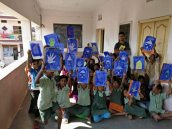 Service can be fraught with challenges, outlined below by the group who went to Zilla Parishad boys hostel. They conducted clean-up drives and hygiene campaigns, as well as taught English grammar and basic computer programs.
Service can be fraught with challenges, outlined below by the group who went to Zilla Parishad boys hostel. They conducted clean-up drives and hygiene campaigns, as well as taught English grammar and basic computer programs.
“During our journey, our group collectively presented ideas and took decisions which we thought were feasible. Above that, our group had to face so many barriers for which, we sometimes were on the edge of giving up. Of these many difficulties, some were interaction or communication and management issues. We approached them every Saturday with a variety of activities and games which were very interactive but only a handful of the students were willing to join us. Due to this, our group always felt very disappointed and all the excitement that we came with would wither. At that point of time, it seemed as if my group had lost hope which we took up as a challenge. As a leader, it was my responsibility to motivate them so that our efforts were not futile. Above that, we had a Telugu speaking group and hence, we faced communication problems. We had to balance my school time with the time we gave to these service projects. Still, our group perceived all the problems we faced not as stop signs, but as guidelines. What we could say is that we proposed solutions for every problem. Although all of our solutions and ideas were not executed, we still made a lot of progress. That is the reason why we could say that we didn’t go there to fear their future, we went there to shape it.”
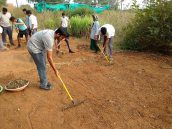 Excerpt from the organic farming group:
Excerpt from the organic farming group:
“When we entered the organic farm, our aim seemed to be impossible as there were weeds all over the farm and the land was not levelled. It was a hard job to do and in order to accomplish it we increased the labour and took help from a botanist. We had to put almost two months on stake before we planted our first seed as we had to remove all the weeds, dig the whole farm, add the manure and finally level it. The sun was splitting the stones but the splendid results kept us motivated. We planted seeds like chilies, okra, eggplant, tomatoes, peas and mint. Most of our work is done for now and the only thing we can do is to water the plants and wait.”
Excerpt from the senior centre service group:
“At the Suvarna Centre in Jubilee Hills our team shared some musical skills with one of the seniors, exchanged anecdotes from our lives and that of theirs, and assisted them in using basic technology. On the contrary, at the Roshini Recreation Centre in Begumpet we focused more on getting to know the seniors and creating a bond with them. We found out a lot of interesting things about the time the seniors were young kids. These include a first person experience of the Second World War, multiple stories from the struggle of independence, and the life of a young Muslim girl and the restrictions put on her. The seniors also talked about life lessons, from basics like adjusting to life in a foreign country to philosophical thoughts about personal struggles in this changing world. It was here we realised that these seniors are laden with treasure – the treasure of knowledge, and that we were their outlets, to keep their stories alive way after them. Our third trip on November 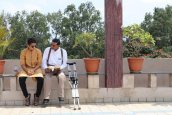 19 was a technological awareness trip at the Suvarna Centre. We not only helped the seniors acquaint themselves with social media like Facebook and Whatsapp and other features of mobile phones like Bluetooth and gaming, but also helped the staff in creating databases and managing records amongst other things. We could connect teaching the seniors with learning basic skills from our parents when we were babies, and this helped us be patient and kind.”
19 was a technological awareness trip at the Suvarna Centre. We not only helped the seniors acquaint themselves with social media like Facebook and Whatsapp and other features of mobile phones like Bluetooth and gaming, but also helped the staff in creating databases and managing records amongst other things. We could connect teaching the seniors with learning basic skills from our parents when we were babies, and this helped us be patient and kind.”



